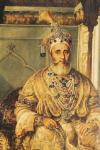Bahadur Shah poet from India was born on October 24, 1775, had 87 years and died on November 7, 1862. Poems were written mainly in Hindi language. Dominant movement is political.
Biography
Abu Zafar Sirajuddin Muhammad Bahadur Shah Zafar, also known as Bahadur Shah or Bahadur Shah II was the last of the Mughal emperors in India, as well as the last ruler of the Timurid Dynasty. He was the son of Akbar Shah II and Lalbai, who was a Hindu Rajput. He became the Mughal Emperor upon his father's death on 28 September 1837. Zafar ,meaning ?victory? was his 'nom de plume' (takhallus) as an Urdu poet.
He has written many Urdu ghazals. After the Indian Rebellion of 1857 the British Administration exiled him from Delhi.
Ascent to the Throne / Masnad
Zafar's father, Akbar Shah Saani II, ruled over a rapidly disintegrating empire between 1806 to 1837. It was during his time that the East India Company dispensed with even the fig leaf of ruling in the name of the Mughal monarch and removed his name from the Persian texts that appeared on the coins struck by the company in the areas under their control.
Bahadur Shah Zafar who succeeded him was not Akbar Shah Saani?s choice as his successor. Akbar Shah was, in fact, under great pressure by one of his queens, Mumtaz Begum to declare her son Mirza Jahangir as the successor. Akbar Shah would have probably accepted this demand but Mirza Jahangir had fallen afoul of the British and they would have none of this.
As Emperor
Bahadur Shah Zafar presided over a Mughal empire that barely extended beyond Delhi's Red Fort. The East India Company were the dominant political and military power in mid 19th-century India. Outside British India, hundreds of kingdoms and principalities, from the large to the small, fragmented the land. The emperor in Delhi was paid some respect by the Company and allowed a pension, the authority to collect some taxes, and to maintain a small military force in Delhi, but he posed no threat to any power in India. Bahadur Shah II himself did not take an interest in statecraft or possess any imperial ambitions. After the Indian Rebellion of 1857 the British Administration exiled him from Delhi.
Emperor Bahadur Shah is seen by some in India as a freedom fighter (he was Commander-In-Chief of the mutiny army), fighting for India's independence from the Company. As the last ruling member of the imperial Timurid Dynasty he was surprisingly composed and calm when Major Hodson presented decapitated heads of his own sons to him as Nowruz gifts. He is famously remembered to have said.
"Praise be to Allah, that descendents of Timur always come in front of their fathers in this way."
As Poet
Bahadur Shah Zafar was a noted Urdu poet, and wrote a large number of Urdu ghazals. While some part of his opus was lost or destroyed during the Indian Rebellion of 1857, a large collection did survive, and was later compiled into the Kulliyyat-i-Zafar. The court that he maintained, although somewhat decadent and arguably pretentious for someone who was effectively a pensioner of the British East India Company, was home to several Urdu writers of high standing, including Ghalib, Dagh, Mumin, and Zauq.
Religious Attitudes
Bahadur Shah Zafar was a devout Sufi. Zafar was himself regarded as a Sufi Pir and used to accept murids or pupils.The loyalist newspaper Delhi Urdu Akhbaar once called him one of the leading saints of the age, approved of by the divine court. Prior to his accession, in his youth he made it a point to live and look like a poor scholar and dervish, in stark contrast to his three well dressed dandy brothers, Mirza Jahangir, Salim and Babur. In 1828, when Zafar was 53 and a decade before he succeeded the throne, Major Archer reported, "Zafar is a man of spare figure and stature, plainly apparelled, almost approaching to meanness. His appearance is that of an indigent munshi or teacher of languages".
As a poet and dervish, Zafar imbibed the highest subtleties of mystical Sufi teachings.At the same time, he was deeply susceptible to the magical and superstitious side of Orthodox Sufism. Like many of his followers, he believed that his position as both a Sufi pir and emperor gave him tangible spiritual powers. In an incident in which one of his followers was bitten by a snake, Zafar attempted to cure him by sending a "seal of Bezoar" (a stone antidote to poison) and some water on which he had breathed, and giving it to the man to drink.
Death
Bahadur Shah died in exile on 7 November 1862. He was buried near the Shwedagon Pagoda in Yangon, at the site that later became known as Bahadur Shah Zafar Dargah. His wife Zeenat Mahal died in 1886.
In a marble enclosure adjoining the dargah of Sufi saint, Qutbuddin Bakhtiar Kaki at Mehrauli, an empty grave or Sardgah marks the site where he had willed to be buried along with some of his Mughal predecessors, Akbar Shah II, Bahadur Shah I (also known as Shah Alam I) and Shah Alam II. ..






